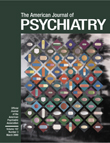Nortriptyline Versus Fluoxetine in the Treatment of Depression and in Short-Term Recovery After Stroke: A Placebo-Controlled, Double-Blind Study
Abstract
OBJECTIVE: This study compared nortriptyline and fluoxetine with placebo in the treatment of depression and in recovery from physical and cognitive impairments after stroke. METHOD: A total of 104 patients with acute stroke enrolled between 1991 and 1997 entered a double-blind randomized study comparing nortriptyline, fluoxetine, and placebo over 12 weeks of treatment. The majority of patients were recruited from a rehabilitation hospital in Des Moines, Iowa, but other enrollment sites were also used. Both depressed and nondepressed patients were enrolled to determine whether improved recovery could be mediated by mechanisms unrelated to depression. Nortriptyline in doses of 25 mg/day gradually increased to 100 mg/day or fluoxetine in doses of 10 mg/day gradually increased to 40 mg/day or identical placebo were given over 12 weeks. Response to treatment of depression for individual patients was defined as a greater-than-50% reduction in scores on the Hamilton Rating Scale for Depression and no longer fulfilling diagnostic criteria for major or minor depression. Improved recovery for a treatment group was defined as a significantly higher mean score from baseline to end of the treatment trial, compared with patients treated with placebo, on measures of impairment in activities of daily living and levels of cognitive and social functioning. RESULTS: Nortriptyline produced a significantly higher response rate than fluoxetine or placebo in treating poststroke depression, in improving anxiety symptoms, and in improving recovery of activities of daily living as measured by the Functional Independence Measure. There was no effect of nortriptyline or fluoxetine on recovery of cognitive or social functioning among depressed or nondepressed patients. Fluoxetine in increasing doses of 10–40 mg/day led to an average weight loss of 15.1 pounds (8% of initial body weight) over 12 weeks of treatment that was not seen with nortriptyline or placebo. CONCLUSIONS: Given the doses of medication used in this study, nortriptyline was superior to fluoxetine in the treatment of poststroke depression. Demonstrating a benefit of antidepressant treatment in recovery from stroke may require the identification of specific subgroups of patients, alternative measurement scales, or the optimal time of treatment.



